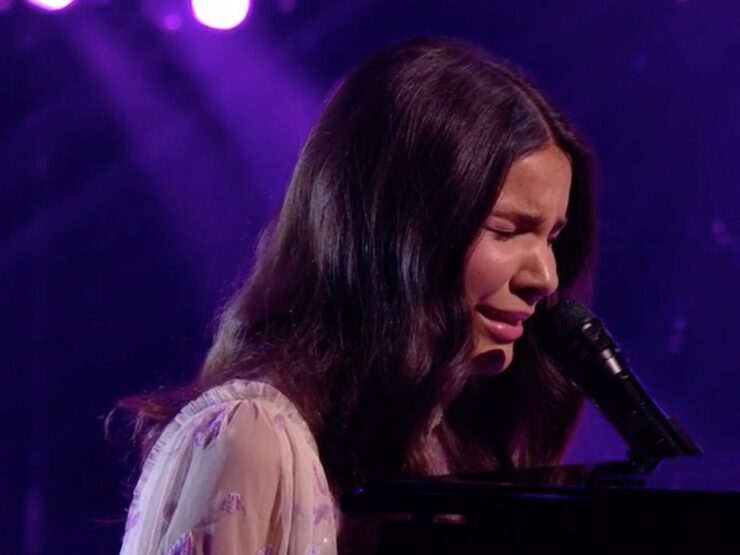Crying when singing can be a difficult thing for most people to talk about, and this is why most singers do not talk about this feeling, as it might be very difficult to understand their emotions and where they are coming from. Is crying good for singing?
How does crying when singing impact the voice? Are there any benefits to doing this? It is not strange for people to cry when singing, and you should know it’s not a sign of weakness either.
When singing and crying simultaneously, you might be at your lowest moment, leaving you very vulnerable. But, on the other hand, you might be remembering or experiencing something that causes you to break down when singing.
We cannot look away from the fact that singing or singers sometimes connect their emotions to their songs’ lyrics.
There are many reasons why you may cry when singing, and here are some of the reasons;
- When you feel overwhelmed with emotions
- You are struggling with a physical problem
- It is the best way to release emotional stress
- You are going through a stage of exhaustion
- It is the best way for you to release anger, anxiety, and other emotions you have been struggling with
Trendy Post – Is Banana Good For Voice
Content Navigation
Is Crying Good For Singing?

We want you to know that crying and singing is very common for singers to cry on stage, and so many popular musicians have gone through this phase at some point in their careers.
The essence of this post isn’t to tell you about the emotions that run through a singer’s mind that cause them to break down, but is crying good for singing?
You might find this very hard to believe but crying when singing is one of the easiest ways a singer can improve and enhance their voice.
Surprised right? I was surprised when I learned about this too some time back, but it should be interesting to know that crying when singing has its magical way of getting rid of strain from your vocal cords. You will be able to blend your voice with vocal registers when you cry and sing simultaneously.
You will be able to communicate your emotions better on a song when crying and singing, and getting your audience on that same wavelength with you earns you a very secure spot in their heart.
This secret has been hidden for so many years, and you can now see that crying and singing have benefits you could never have imagined.
Check This Out – What Food Makes Your Voice Soft And Clear
Furthermore, aligning the vocal cord is another advantage of being a crybaby when you sing. So many people have realized these benefits and look forward to crying and singing, but trust me when I say this can only come naturally.
You can’t fake crying, or you won’t be able to get the benefits you desire. You have to be in tune with the song’s emotions before you can shed a tear while singing.
One of the reasons a baby cries so loud is the perpetual state of mix it is in, and this state is also a state of good chord alignment.
It means they will not be able to cry wrong, and you should also understand that babies haven’t been taught anything wrong at that stage of their life. They haven’t been around long enough to develop any bad traits at the stage they are in.
You can see how clear their voices are when they cry, right? It is an example of the right vocal technique, and this is what most singers exhibit when they genuinely cry while singing.
They sound very clear, having a great tone, pitch, and range when they cry on stage while singing. However, singing alone sometimes can be boring, and you need to find ways of creating new and fun sensations in the brain.

What Difference Will It Make?
Look for a song you know how to sing very well, get familiar with a particular line from the song you love and pretend to be crying while you sing this particular line.
Imagine receiving heartbreaking news and communicating whatever you feel at that moment in the song. Then, try milking this feeling, make your voice shake, and you will hear the difference in how you sound. Trust me when I say this is amazing.
You will sing with ease when you do not, and you will also be able to produce richer tones when you cry while singing. One thing about the crying technique when singing is it helps in adding a new and better dimension to your voice.
However, there’s no need to do it for every note you sing, but you should identify the lines in the song that will trigger tears while singing.
It can send chills down your audience’s spine, and this technique can be very helpful when you do it on days that you are having difficulty when singing aloud.
It might sound funny but crying while singing on your bad vocal days has a way of helping you sing and sound better. In addition, you will enjoy the extra tone and freedom that it comes with.
Constantly trying out this technique will help you get very good at it, and you can be able to apply it to the next performance you have.
Sometimes, overdoing this might be a ridiculous thing to think of, but it is also the easiest way you can adopt when trying to identify your sweet spot. The sweet spot is where your crying voice sounds sweet and best, and it will be very helpful for you to identify it.
Frequently Asked Questions (FAQ)
Does Crying Make Your Voice Higher?
You will likely notice a thin voice when you cry, and you will also move from a thin configuration to an aspiration and breathing style when you cry while singing. These are the two things to note about the voice while crying and singing.
How Do You Make The Voice Sound Better After Crying?
One of the best things you can do after crying is to calm down because you have to rest your vocal cords for a while to return to their normal state. It would help if you did this, or you might end up causing more injuries to your voice.
Rounding Up
Have fun and play with this technique, and you are guaranteed to be very good at it. You can consider trying it out for about ten minutes every day, and you will see how great this technique will improve your tone and all other aspects of your voice while singing.

